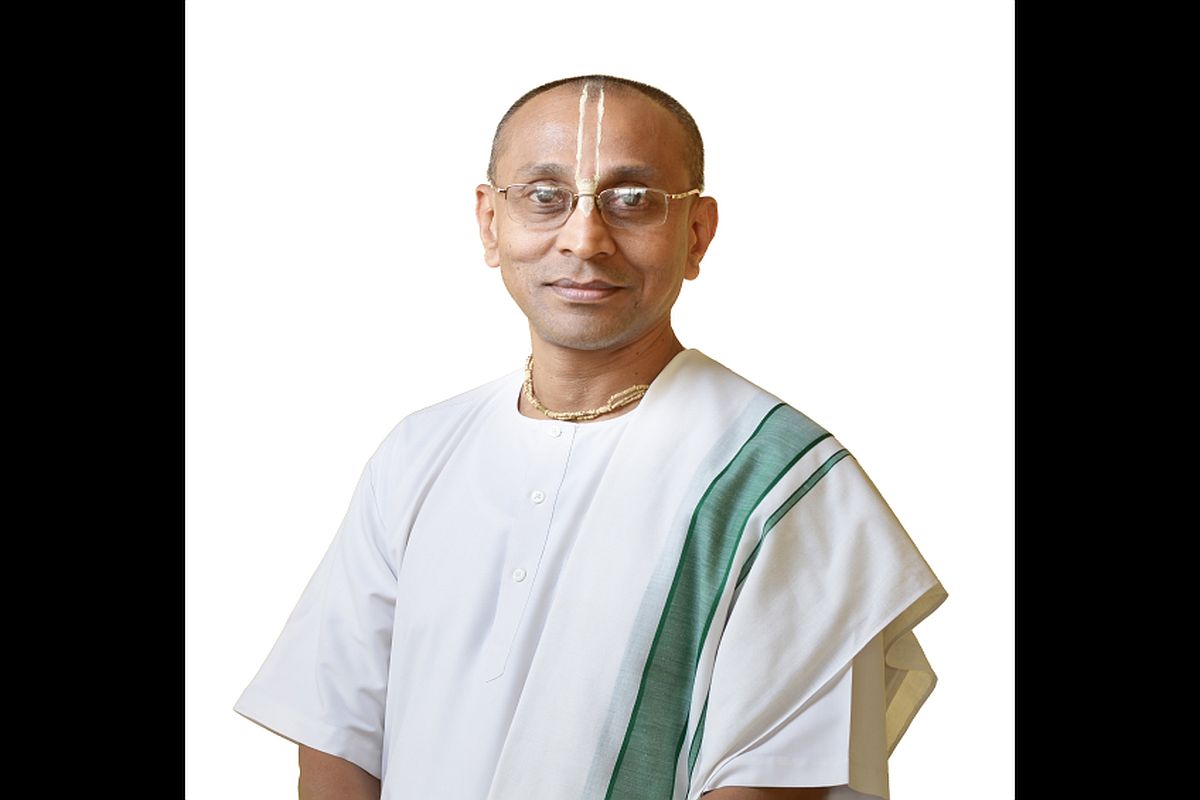Trump announces US withdrawal from World Health Organisation
Trump has long been critical of the WHO, and his administration formally withdrew from the organisation in July 2020 as the Covid-19 pandemic continued to spread.
Since 2000, Akshaya Patra has been concerting all its efforts towards providing fresh and nutritious meals to children on every single school day.

Akshaya Patra Foundation Vice Chairman Chanchalapathi Dasa. (Photo: SNS)
Akshaya Patra Foundation – a premier in the classroom hunger eliminating organisation has been pivotal during the global health crisis by coming up with aid for migrant workers and needful population.
Since 2000, Akshaya Patra has been concerting all its efforts towards providing fresh and nutritious meals to children on every single school day.
Advertisement
The organisation claims that their partnership with the Government of India and various State Governments, along with the persistent support from corporates, individual donors, and well-wishers have helped us to grow from serving just 1,500 children in 5 schools in 2000 to serving 1.8 million children.
Advertisement
Today, we are having Chanchalapathi Dasa, Vice Chairman of Akshaya Patra to give an insight into the efforts that the organisation took during the lockdown, induced due to the global pandemic.
1. Akshaya Patra is known for running the largest school meal program and now, during the COVID-19 outbreak, we have seen you serve the migrants labourers and daily wage workers. What was the driving force behind this initiative?
Akshaya Patra’s journey began back in the year 2000 driven by the vision of a hunger-free world. Even today, this vision serves as the inspiration for all our feeding endeavours, including the ongoing relief feeding efforts. The COVID-19 pandemic and the containment measures to curb its spread have affected the lives of people in every section of life, especially vulnerable communities like migrant labourers and homeless people. With the schools closed due to the pandemic, we decided to use our kitchen infrastructure and resources to aid the Government’s efforts to help these communities by serving freshly cooked meals and distributing food relief kits with essential groceries in various locations across the country.
2. A lot of people came forward with donations to help you carry out this initiative including the Government. Tell us more about it and the extent of the impact.
We have been initiating COVID-19 food relief efforts in association with the Government of India, State Governments and other civic administrations in various locations across the country. We are grateful to the Government for placing their trust and confidence in our services, helping us to reach out to people in need in these times of adversity.
With several individuals and corporates proactively coming forward to support our COVID-19 food relief efforts, my belief that people generally have a positive outlook on social good was validated yet again. Smt. Sudha Murty and Shri. Narayana Murthy and their family, for instance, donated ₹10 Crores from their personal funds towards our relief work, enabling us to distribute over 1.33 lakh food relief kits, amounting to 55,86,000 meal servings, in various locations across the country.
Similarly, several corporate houses, including the Infosys Foundation, Nestle India, PepsiCo Foundation, Deutsche Bank, DLF Foundation, etc., pledged their support to our endeavour. We also received the in-kind support of FMCG manufacturers such as General Mills and Britannia. Renowned celebrities, such as Hrithik Roshan and Raveena Tandon, also contributed to our efforts. In addition, we had volunteers from corporate houses selflessly coming forward to help with the packing and distribution of food relief kits as well as serving of meals.
The persistent support of all our stakeholders enabled us to cumulatively serve over 6 crore meals to people from vulnerable communities over the last three months. I am thankful to them for standing by us to serve people during this pandemic.
3. What challenges did you face while feeding or cooking during the lockdown? What measures did you take to maintain social distancing & Sanitization and fulfil other norms of the lockdown while serving the needy?
Undertaking relief feeding on a large scale during a pandemic, with the containment measures in place, had its share of challenges. We were aware of the urgency as well as the criticality of the endeavour. Therefore, we strived to maintain the highest standards of safety and hygiene in all our processes. We also had to take into consideration the safety of our staff and volunteers who stepped up in the hour of need. Manpower requirement was another challenge we faced initially. As we scaled our operations, our manpower requirements increased. We were able to meet them because of individuals selflessly coming forward to volunteer at our facilities.
As far as challenges related to logistics are concerned, timely permissions and authorizations from the State Governments and civic administrations were crucial in ensuring that they were minimal. In the case of raw material procurement, for instance, the necessary permits from concerned authorities for the movement of delivery vehicles and our cordial relations with the suppliers ensured that the supply chain was not affected.
4. What is the main problem that you are facing during this epidemic?
The biggest challenge for us during our COVID-19 relief efforts was to ensure the safety of our staff and volunteers, especially since it was an outbreak classified as a pandemic by the World Health Organisation (WHO). We conducted an orientation on personal hygiene, hand sanitisation and social distancing for everyone involved in the relief efforts. Security guards were assigned to man the entrance of the premises and screen employees and volunteers with a handheld infrared thermometer. Everyone, including the volunteers, was asked to use proper respiratory masks during the commute and their temperature is checked at the entrance before entering the kitchen or packaging facility. Furthermore, they were strictly instructed to report any kind of illness to immediate supervisor and seek medical attention immediately if they are showing any signs of cold, cough, fever or breathlessness.
Advertisement